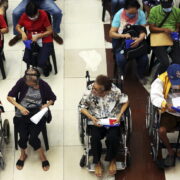Deepfake photos of kids for online exploitation ‘an emerging threat’
The chief of the Council for the Welfare of Children (CWC) on Tuesday expressed concern over the dangers of using artificial intelligence (AI) as a tool in generating deepfake photos of children for online sexual abuse and exploitation.
During the “Bata, Bida Ka!” program for the 31st National Children’s Month, Angelo Tapales, social welfare undersecretary and executive director of the CWC, lamented the emerging threat on the safety of kids, which has already happened in other countries.
In AI-generated images of child sexual abuse, Tapales said a child is not needed anymore because the technology could easily make fake, obscene photos or videos of the person.
“For me, it introduces a new species of violators,” he said.
Legal measures
Justice Secretary Jesus Crispin Remulla last week urged Congress to look into possible legal measures to address the issue, particularly in laying down specific offenses that can be charged against the people who use AI to sexually exploit children.
Tapales added besides online sexual abuse, Filipino children continue to face various forms of violence based on reports recorded by the Philippine National Police.
Based on the 2022 data of the PNP Women and Children Protection Center, out of 19,131 reported cases: 8,701 were about child abuse; 7,910 rape cases; and 1,902 acts of lasciviousness committed against children.
In 2023, Tapales said they remained as the top three types of cases reported to the PNP.
Starting Dec. 5, Tapales said they would tap allies in Congress to push for the establishment of the Philippine Commission on Children.
70 cases
Meanwhile, a group of victim-survivors of sexual abuse and advocates for gender equality on Tuesday urged the Department of Education (DepEd) to release the outcome of all 70 reports of sexual abuse they received, including whether administrative or criminal charges were filed against the perpetrators.
Vice President and Education Secretary Sara Duterte earlier announced that one year since DepEd’s helpline was launched, it received a total of 1,709 complaints, with verbal abuse being the most common form of violence experienced by students in schools.
Based on the data provided to the Inquirer, the Learner Rights and Protection Office of DepEd recorded 213 reports of violence against students, with 77 reports of verbal abuse, followed by 70 on sexual abuse and 66 about physical bullying. INQ
















